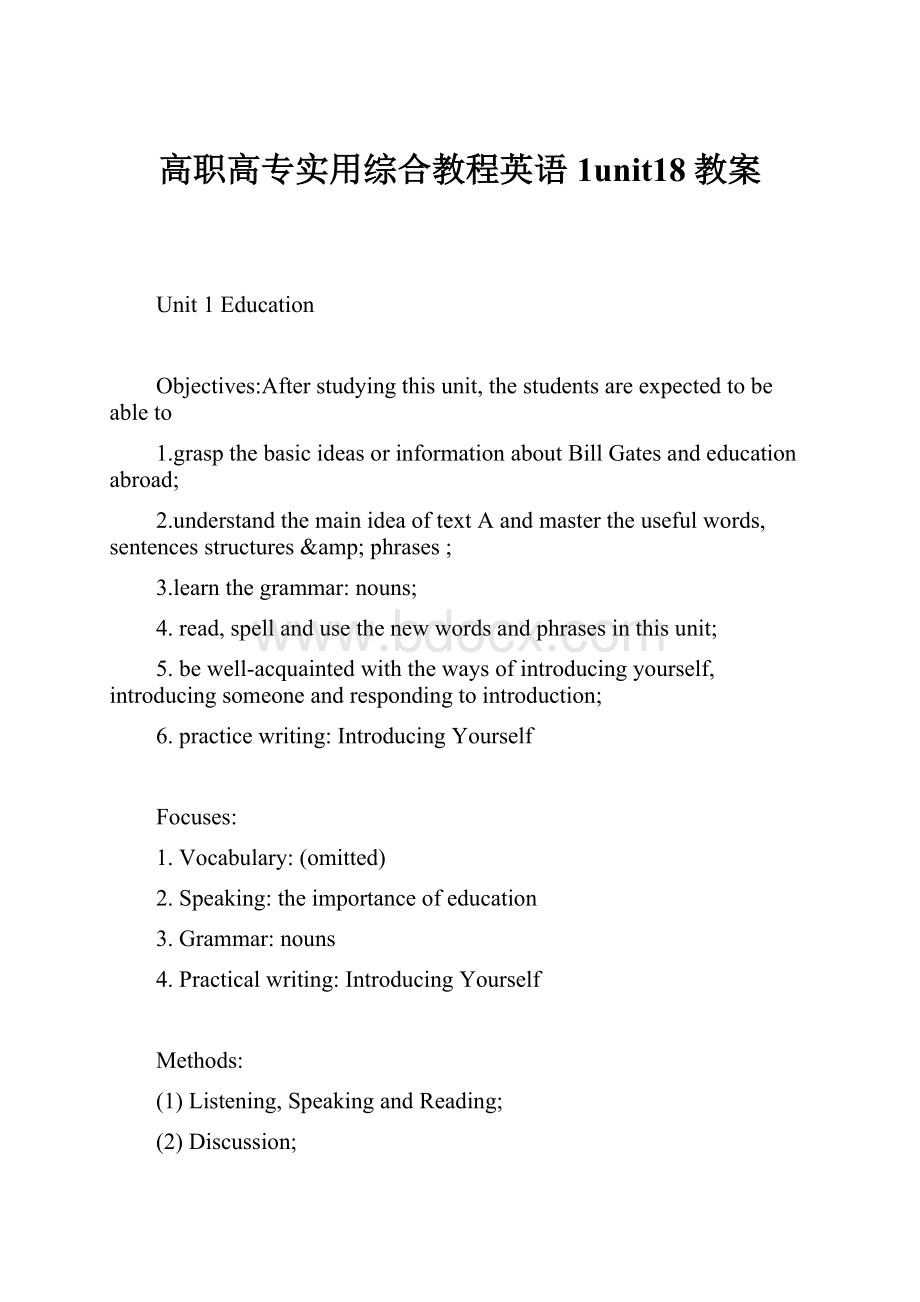高职高专实用综合教程英语1unit18教案.docx
《高职高专实用综合教程英语1unit18教案.docx》由会员分享,可在线阅读,更多相关《高职高专实用综合教程英语1unit18教案.docx(78页珍藏版)》请在冰豆网上搜索。

高职高专实用综合教程英语1unit18教案
Unit1Education
Objectives:
Afterstudyingthisunit,thestudentsareexpectedtobeableto
1.graspthebasicideasorinformationaboutBillGatesandeducationabroad;
2.understandthemainideaoftextAandmastertheusefulwords,sentencesstructures&phrases;
3.learnthegrammar:
nouns;
4.read,spellandusethenewwordsandphrasesinthisunit;
5.bewell-acquaintedwiththewaysofintroducingyourself,introducingsomeoneandrespondingtointroduction;
6.practicewriting:
IntroducingYourself
Focuses:
1.Vocabulary:
(omitted)
2.Speaking:
theimportanceofeducation
3.Grammar:
nouns
4.Practicalwriting:
IntroducingYourself
Methods:
(1)Listening,SpeakingandReading;
(2)Discussion;
(3)Presentation;
(4)Exercises;
(5)Writing.
Contents:
Step1.ListeningandSpeaking&Warm-upDiscussion
Askthestudentstotalkabouttheimportanceofeducation;
Step2.BackgroundInformation
(1)BillGates;
(2)EducationinChina;
(3)EducationAbroad;
(4)RelatedWords:
大学专科:
short2-3-yearhighereducation
重点大学:
keyuniversity
注册人数:
enrollment
希望工程:
ProjectHope
义务教育:
compulsoryeducation
普及教育:
universaleducation
伙食补助:
foodallowance
学分制:
thecreditsystem
辅导员:
assistantforpoliticalandideologicalwork
学生会:
students‘union
专业课:
specializedcourse
必修课:
required/compulsorycourse
选修课:
elective/optionalcourse
奖学金:
scholarship
专业:
major
补考:
make-upexamination
系:
department
Step3.VocabularyinTextA
LeadtheSstoreadnewwordsandexpressionsandthenreadthenewwordstogether.Explaintheimportantlanguagepoints.
1.educationn.教育
e.g.Childreninpoorareasreceivefreeeducation.贫困地区的孩子接受免费教育。
educatev.教育
educatedadj.受教育的e.g.awell-educatedman一位受过良好教育的人
educationaladj.教育的e.g.aneducationalmovie一部教育影片
educatorn.教育家,教育者
2.countv.派用场,点数
e.g.Everysecondcounts.每一秒钟都很重要。
e.g.Counttheseapples.清点一下这些苹果。
countdown倒计时
countsb.in把。
。
。
算在make/offerasuggestion提议
e.g.Wewilllistentoanyonewhomakessuggestionsforthethemeoftheparty.
关于晚会的主题我们会听取大家的意见。
suggestv.建议
e.g.I‘dliketosuggestsomethingelse.我有其他的提议。
asuggestionofasmile一丝笑容
suggestdoingsth.建议做。
。
。
5.successn..成功
succeedv.成功完成
successfuladj.成功的
successiveadj.接连的
successionn.接连
successorn.继承人;接班人
succeedindoingsth.成功完成。
。
。
e.g.Hesucceededinmakinghisdreamcometrue.他成功实现了梦想。
6.advantagen.有力条件;优点
e.g.Thisproducthasmanyadvantages.这种产品优点很多。
disadvangen.不利;不利条件
advantageousadj.有利的;便利的
takeadvantageof很好地使用
7.part-timeadj.&adv.兼职的(地)
full-timeadj.&adv.全职的(地)
e.g.afull-timehousewife全职主妇
8.discouragevt.不鼓励;使泄气
discouragedadj.泄气的
discouragingadj.使泄气的
couragen.勇气
encouragevt.鼓励
encouragesb.todosth.鼓励。
。
。
做。
。
。
e.g.Iencouragedhertoworkhard.我鼓励她努力工作。
9.spiritn.精神
amanofspirit精神饱满的人
teamspirit团队精神
fightingspirit斗志
ingood/high/greatspirit精神好,兴致好
10.highlyadv.高度地
ahighlyinterestingstory一个非常有趣的故事
ahighlypaidjob一份薪水优厚的工作
speak/thinkhighlyof对。
。
。
给予很高评价
e.g.Theleaderspeakshighlyofourwork..领导高度赞扬了我们的工作。
11.focusv.使集中;使聚焦focuson集中经历于。
。
。
12.rangen.范围
withinthepossiblerange在可能的范围内
arangeof一系列的;很多的
rangefrom…to…在。
。
。
之间(温度的变化等)
rangebetween…and…在。
。
。
之间(年龄段等)
13.hundredsof好几百,许许多多
14.dropoutof退学;不参与,退出
15.anumberof+可数名词(复)
thenumberof+不可数名词
16.askfor询问
17.chanceofalifetime千载难逢的良机
18.tryout试验;考验
19.inshort总之
Step4.VocabularyCheckPartB&C
Askthestudentstofinishtheexercises,vocabularycheck(partBandC).Thenchecktheanswers.Period2
Step1.LanguagePointsinTextA
ExplainthelanguagepointstoSsandanalyzethesentencestructuresofthepassage.
1.Theywanttoknow…whatIdid.中的从句:
(1)SubjectiveClause主语从句
e.g.HowtoimprovetheirEnglishisoftendiscussedamongthestudents.
e.g.HowtheycanimprovetheirEnglishisoftendiscussedamongthestudents.
(2)ObjectiveClause宾语从句
e.g.Wehaven‘tdecidedwhentovisittheplace.
e.g.Wehaven‘tdecidedwhenweshallvisittheplace.
(3)AppositiveClause同位语从句
e.g.Youhaven‘tansweredmyquestionaboutwheretogetbooks.
e.g.Youhaven‘tansweredmyquestionaboutwhereIcangetbooks.
2.Itis+adj.+for/ofsb.+todosth.
e.g.Itiscarelessofyoutomakesuchamistake,
e.g.Itiseasyformetoseethroughhistrick.
3.―AsI‘vesaidbefore…considercarefully.‖
(1)此句是non-restrictiverelativeclause(非限制性关系从句<可省略>)introducedby―as‖;e.g.Aspeopleexpected,shewasadmittedtoBeijingUniversity.
(2)―unless‖isaconjunctionforadverbialclauseofcondition(条件状语从句),whichequals‖if…not(除非)‖
e.g.Iwon‘tleaveunlesstherainstop.
4.―Inmycompany‘searlyyears…schooltowork.‖
(1)plantodosth.:
intendtodosth.
e.g.IplantomakeatriptoBeijingduringthesummervacation.
(2)whoplannedto…work:
restrictiverelativeclause(限制性关系从句<不可省略>)introducedby―who‖;
e.g.Idon‘tlikepeoplewhopryintoothers‘privatebusiness.
5.―Highschoolandcollege…teamspirit.‖中‖thatteachyouaboutteamspirit‖isarestrictiverelativeclause(限制性关系从句<不可省略>)introducedby―that‖.
e.g.HewastheonlyonethatIknewthere.
6.―Forme,classroomisnot…canlearn.‖中‖whereyoucanlearn‖isarestrictiverelativeclause(限制性关系从句<不可省略>)introducedby―where‖.
e.g.Thisistheplacewherehestayedhiswholelife.
7.‖Inshort,it‘srealmistake…educationdoescount.‖中‖it‘sarealmistakenottotakethe
chance‖isanegativeinfinitivestructure(否定不定式结构),―not‖isplacedbeforeaninfinitive.e.g.Weareaskednottospeakloudlyinclass.
Step2.ComprehensionofTextA
Givestudents5minutestogothroughthetext,askthemtofinishtheexercisesthenchecktheanswers.
Step3.Homework
FinishtheUnit1exercisesinworkbook.
Period3
Step1。
GrammarTips:
noun名词
AskSstopreviewtheexplanationandthengivefurtherintroductionofthegrammartips.DotheexercisestocheckoutwhetherSsknowitwell.
表示人、事物或抽象概念的词叫名词,可以分为专有名词(表示具体的人、事物、地点或机构的专有名称)和普通名词(表示某类人或某类事物的名称:
个体名词、集体名词、物质名词、抽象名词);根据名词是否有复数形式,还可以分为可数名词和不可数名词。
(具体例词请详见P9)
Step2.Practice
Givestudentstenminutestogothroughandfinishtherelativeexercises.
PracticalWriting:
IntroducingYourself(P15)
Bewell-acquaintedwiththewaysofintroducingyourself,introducingsomeoneandrespondingtointroduction;Itisnecessarytoteachsomewritingskillsbeforehand,andthenstudythesamples.
AskSstowriteanoteashomework..
Period5
Finishtheotherexercisesinworkbookandchecktheanswers.
Period6
ListeningPractice(afterclass)
Unit2Greeting&Friendship
TeachingObjectives:
1.Learninformal,formalgreetingandfarewell;learnhowtogreetanacquaintance.
2.BeingabletogetthemainideaandsomeimportantdetailsoftextA;gothroughtext
B.
3.hurt,mean,miss,plan,operator,neighbourhood,discover,device,amazing,
hammer,sympathy,mouthpiece,moment.sob,bleed,fridge,comfort,pet,belong,land,airport,dial,hometown,plan,pause,mean
4.
Learnhowtotalkaboutlikesanddislikesandhowtomakefriends
5.
Pronouns
6.Howtowritepersonalletters
TimeAllotment:
1st&2ndperiods:
Listening&Speakingactivities;3rd&4thperiods:
Readingactivities;
5th&6thperiods:
Grammar&Practicalwriting.
TeachingSteps:
1st&2ndperiods:
Listening&Speakingactivities
Step1.BasicPatternsIntroduction
Good(morning/afternoon/evening).
Howareyou?
Howarethings?
Haveaniceweekend.
Goodbye.
Step2.PartOne:
Warm-upActivity
Askthestudentstoworkinpairsandmakedialoguesaccordingtothesituations.Topic:
say―Hello‖tootherpeople
Step3.PartTwo:
ListeningandSpeaking
SectionA
1.ListeningActivities
①LeadthestudentstoreadtheNewWordsandExpressions.
②Leadthestudentstodiscussandanticipatehowclosefriendswillgreeteachother:
Hi.\What‘sup?
\How‘severything?
③Playtherecordingtwice,andletthestudentsdoActivityA/B
2.SpeakingActivities
①Tellthestudentsthefollowingdialogueisbetweentwostudentswhohaven‘tseeneachotherforalongtime.
②Playtherecording,andremindthestudentstofocusontheexpressionstheyareusedtogreeteachother.
③Letthestudentspracticethedialogueinpairs;
④ActivityB:
makedialogues
SectionB
1.ListeningActivities
①LeadthestudentstoreadtheNewWordsandExpressions.
②Tellthestudentsthefollowingdialogueisbetweenastudentandherteacher.③Playtherecordingtwice,thenaskthestudentstodotheExercises.
2.SpeakingActivities
①GoovertheNewWordsandExpressions.
②Tellthestudentsthattherearethreepeopleinthedialogue:
David,hiscolleagueandhisboss.
③Playtherecording,andremindthestudentstofocusontheexpressionstheyareusedtogreetone‘scolleagueandboss.
④Letthestudentspracticethedialogueingroupsofthree;
⑤ActivityB:
makedialogues
SectionC
1.ListeningActivities
①GoovertheNewWordsandExpressions.
②Tellthestudentsthattheyaregoingtolistentoadialoguebetweenacquaintances.③Playtherecordingtwice,thenaskthestudentstodotheExercises.
2.SpeakingActivities
①Playtherecordingtwice,thenletthestudentspracticethedialogueingroupsofthree.
②ActivityB:
makedialogues
Step4.PartThree
CultureNotesDiscussion(Page27)
Step5.HomeworkAssignment
After-classActivities(Page27)
3rd&4thperiods:
Readingactivities
Step1.Warm-upActivities
DividetheclassintogroupsoffourtofiveSs.GivethemthefollowingQstodiscuss,andencouragethemtogivetheirownopinions.
①Doyouhavemanyfriends?
Howdidtheybecomeyourfriends?
②Friendshipmaysometimesexertagreatimpacto